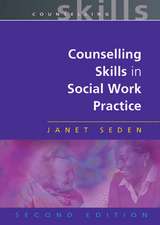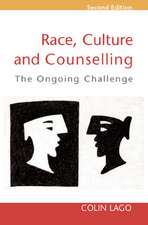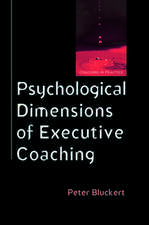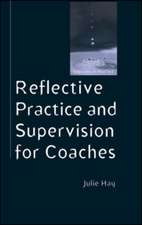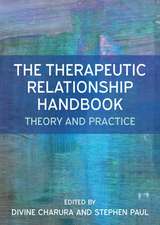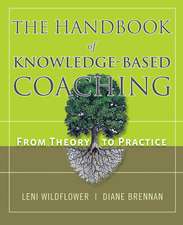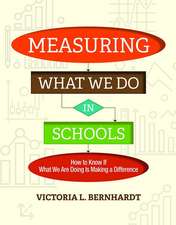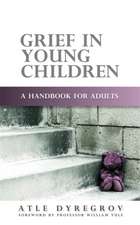The Hidden History of Coaching
Autor Leni Wildfloweren Limba Engleză Paperback – 16 feb 2013
Diane Brennan, MBA, MCC, Past President International Coach Federation (2008)"Leni Wildflower's book provides an answer to the question 'What are the roots of coaching?' This answer contributes to addressing the follow-up questions 'What are the theoretical underpinnings of coaching?' and 'How can the underlying theories shape my practice as a coach?' If you are looking for the answer to any of these questions, read this book."
David Megginson, Emeritus Professor of HRD, Sheffield Business School, UK
"This book is unique. It offers readers both an inside perspective about the names who have made coaching and a critical analysis of the ideas, theories and concepts which have shaped coaching as the leading personal development strategy for the 21st century. Leni's clear writing style offers the reader a ring side seat for this journey through the history of coaching."
Professor Jonathan Passmore, Evora University
"Coaching's greatest strengths and its greatest weaknesses lie in its emergence in different guises, with different philosophies, within a short space of time. In classic Darwinian fashion, it has grown rapidly, but its mongrel origins make it almost impossible to pin down. Hence the continuing problem of conducting meaningful, empirical research, when what you try to measure is constantly morphing. Leni Wildflower has pulled together many of these threads to weave a tapestry of the evolution of coaching theory and practice. Wisely, she seeks to describe rather than evaluate and in doing so has produced a volume that will be of immense value in coach training."
David Clutterbuck, David Clutterbuck Partnership, UK
As coaches we need to know where our core ideas come from. Furnished with such knowledge we have access to a much more flexible toolkit, and are in a better position to judge where and when to call on one technique rather than another. Many of the psychological theories and therapies, and the social and spiritual movements out of which coaching has evolved, remain relatively unknown and unacknowledged. They constitute our Hidden History.
This immensely readable book fills a serious gap in our understanding of the origins of coaching. It is unique in tracking not just the tangled roots of contemporary coaching practice, but also in giving insights into the founders and developers of these earlier approaches to human development - quirky individuals and brilliant theorists, many with flaws and foibles and heroic personal stories. Fascinating in themselves, these narratives contribute to a richer understanding of our shared principles.
Preț: 243.92 lei
Nou
Puncte Express: 366
Preț estimativ în valută:
46.67€ • 48.86$ • 38.62£
46.67€ • 48.86$ • 38.62£
Carte tipărită la comandă
Livrare economică 07-21 aprilie
Preluare comenzi: 021 569.72.76
Specificații
ISBN-13: 9780335245406
ISBN-10: 0335245404
Pagini: 184
Ilustrații: black & white illustrations
Dimensiuni: 153 x 229 x 12 mm
Greutate: 0.27 kg
Ediția:New.
Editura: McGraw Hill Education
Colecția Open University Press
Locul publicării:United Kingdom
ISBN-10: 0335245404
Pagini: 184
Ilustrații: black & white illustrations
Dimensiuni: 153 x 229 x 12 mm
Greutate: 0.27 kg
Ediția:New.
Editura: McGraw Hill Education
Colecția Open University Press
Locul publicării:United Kingdom
Cuprins
Series editor's preface
Acknowledgements
Foreword
IntroductionPart 1: Here comes everybody
Self-help in hard times: the early motivational gurus
On the edge: human potential and the Esalen Institute
Reaching for the marvellous: Spiritual and mystical contributions
Marketing transformation: from est to NLP
From tennis court to executive office: the Inner Game and GROW
Part 2: What makes us tick
Tapping the unconscious: Sigmund Freud and Carl Jung
Our bodies ourselves: From Wilhelm Reich to Julio Olalla
Searching for Wholeness: Fritz Perls and gestalt
From neurosis to ecstasy: humanist and transpersonal psychology
Strategies for change: CBT and TA
Part 3: The self and others
We are not alone: self, family, and society
Identity and employment: finding ourselves in the workplace
Psychometrics: from IQ to MBTI and beyond
Bibliography
Acknowledgements
Foreword
IntroductionPart 1: Here comes everybody
Self-help in hard times: the early motivational gurus
On the edge: human potential and the Esalen Institute
Reaching for the marvellous: Spiritual and mystical contributions
Marketing transformation: from est to NLP
From tennis court to executive office: the Inner Game and GROW
Part 2: What makes us tick
Tapping the unconscious: Sigmund Freud and Carl Jung
Our bodies ourselves: From Wilhelm Reich to Julio Olalla
Searching for Wholeness: Fritz Perls and gestalt
From neurosis to ecstasy: humanist and transpersonal psychology
Strategies for change: CBT and TA
Part 3: The self and others
We are not alone: self, family, and society
Identity and employment: finding ourselves in the workplace
Psychometrics: from IQ to MBTI and beyond
Bibliography


